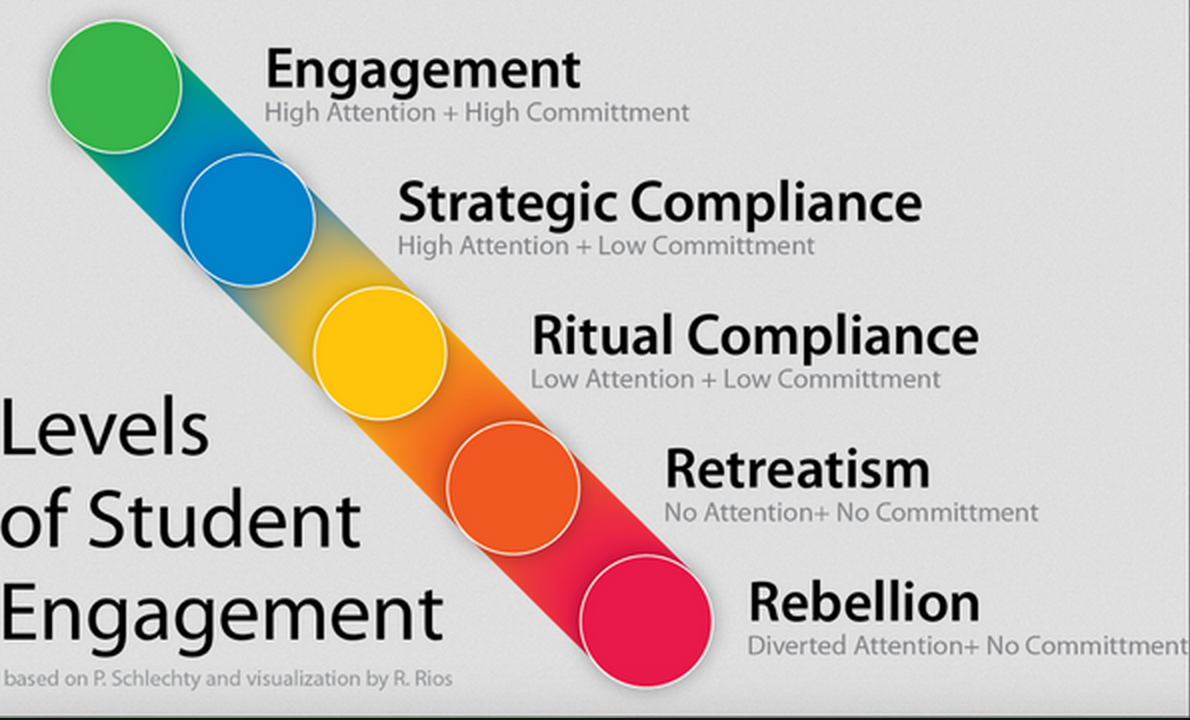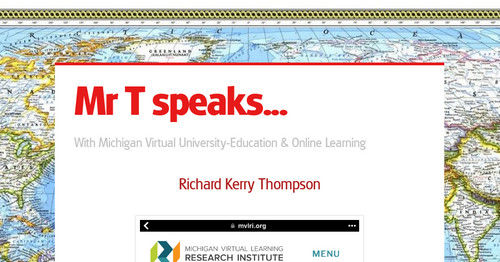Levels of Student Engagement
Research - RKT
Sit & Get ?
This brilliant chart of 1-5 gives a brilliant example of just that inquiry created by Philip Schlecty.
May it help the teacher, parent, administrator, and student understand to then have a growth mindset to reach their full potential.
Richard Kerry Thompson
Mr. T
RKT
Schlechty's Levels of Engagement
https://www.youtube.com/watch?v=256hluHbp2o
Here’s where Schlecty’s Levels of Engagement becomes helpful. It provides a useful framework for thinking about what it means for students to be genuinely engaged in their learning. Schlecty defined it this way, “Engagement is active. It requires the students to be attentive as well as in attendance; it requires the students to be committed to the task and find some inherent value in what he or she is being asked to do.
The engaged student not only does the task assigned but also does the task with enthusiasm and diligence.” Schlecty focused on two core areas of a task.
The first is attention. This is the idea that a student should be focused on the specific task, without being distracted.
The second is commitment. This is the idea that a student should find the task intrinsically motivating and challenging and therefore work toward mastering it. In 2002, Phillip Schlecty developed a framework for thinking about student engagement based on these two core ideas of attention and commitment.
At the bottom, you have rebellion, which involves diverted attention and no commitment to the task. This is the student who seems to be acting out and causing disruptions. As a result, they fail to learn from the task. Next, you have retreatism, with no attention and low commitment. Unlike the rebellion, the student in retreat is not actively disrupting the learning but instead seems to be checked out.
This student is often distracted and emotionally withdrawn from the task. As a result, this student learns little or nothing from the task. At the next level, you have ritual compliance (which was originally called passive compliance). This involves both low attention and low commitment. Unlike retreatism, a ritually compliant student isn’t completely checked but instead is doing the bare minimum to avoid confrontation. This student will learn at a low level from this task and will not retain it over time.-3 Next is strategic compliance. Often, this looks like engagement because a student might be performing at a high level.
Here, the student has high attention on the task but a low commitment. This student is playing the game of school, focused on things like grades, parental approval, rewards, or class rank. But the learning isn’t intrinsically rewarding. As a result, this student will often learn at a high level but fail to retain the learning or transfer it to a new context.
Finally, you have engagement. This requires both high attention and high commitment. Here, a student completely buys in out of a strong instrinsic motivation by meaning, choice, and challenge. This student will continue focusing even when the task gets more complex and challenging and often will choose to learn it even when it is ungraded. This student will learn it at a deep level and transfer it to new contexts.
This is why it’s important that we, as teachers, focus on how to make the subject intrinsically engaging for all students by tapping into curiosity, creativity, and purpose. When this happens, students are more likely to grow into passionate, life-long learners.
SOURCES: Patall, E. A., Cooper, H., & Robinson, J. C. (2008). The effects of choice on intrinsic motivation and related outcomes: A meta-analysis of research findings. Psychological Bulletin, 134(2), 270-300. http://dx.doi.org/10.1037/0033-2909.1... Schlechty, P. C. (2001). Shaking up the schoolhouse. San Fransisco, USA: Jossey-Bass Publishers. Schlechty, P. C. (2002). Working on the work an action plan for teachers, principals and superintendents (1st ed.). San Fransisco, USA: Jossey Bass. Schlechty, P. (2011). Schlechty center on engagement. Retrieved from http://s3.amazonaws.com/www.schlechty... 15798
****
Below please find an interview with RKT on Engagement and Online learning
Richard Kerry Thompson
Email: rktcarpediem@gmail.com











